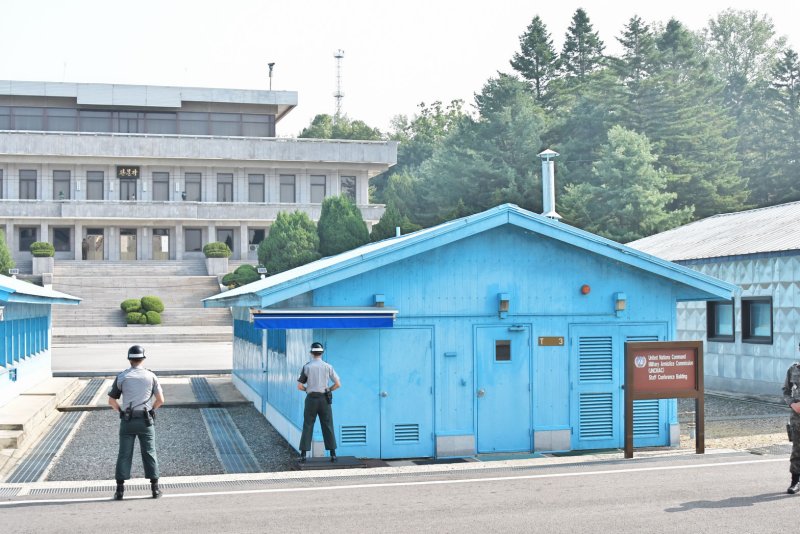Chinese and Japanese media reported North Korea's conciliatory gesture toward the South is likely a ploy to weaken its ties with the U.S. File Photo by Keizo Mori/UPI |
License Photo
SEOUL, South Korea, Jan. 3 (UPI) -- As talks of dialogue mark a shift in the long-stalled inter-Korean relations, Chinese and Japanese media warn that the North is trying to create a rift between Seoul and Washington.
While Beijing's foreign ministry welcomed recent efforts by the two Koreas to improve their ties, notably through the restoration of a direct communication line on Wednesday, Chinese security experts questioned North Korea's sudden willingness to talk, News 1 reported.
North Korean leader Kim Jong Un took an unusually conciliatory tone toward the South during his New Year's address, suggesting the dispatch of a North Korean delegation to the Pyeongchang Winter Olympics and "urgent talks" to make the arrangements.
His offer was met with a prompt response from Seoul which proposed reestablishing the inter-Korean hotline and holding high-level talks.
Kim Jong Un is said to "highly and positively regarded" South Korea's reaction as he agreed to reconnect the communication channel.
Steve Tsang, a professor at the School of Oriental and African Studies told South China Morning Post that the North Korean leader's recent overtures exemplify a "classic divide and rule diplomacy."
""Kim is clearly seeking to drive a wedge between the [South Korean] Moon Jae-in administration and the Trump administration. This is an attempt to kill two birds with one stone - to reduce tension between the North and the South on the one hand, and increase tension between Trump and Moon on the other," Tsang told the paper.
Whether this will result in a general easing of tension on the peninsula remains to be seen, he said.
Zhang Liangui, a professor at the Central Party School of the Communist Party, shared this view.
Even if inter-Korean dialogue is held, Zhang doubted the North would be dismantling its nuclear program any time soon.
He said, " After declaring Pyongyang as a de facto nuclear-armed state, Kim is clearly moving towards the next step of his nuclear weapons plan."
This involves finding ways to overcome deepening economic sanctions on the regime and sow division within the alliance between South Korea and the U.S., according to Zhang.
The North Korea leader in his New Year's speech said the North will continue to advance its nuclear weapons program as a "peaceful" nuclear power and threatened it has the capacity to strike the U.S. mainland upon the touch of his "nuclear button."
Japanese daily Yomiuri Shimbun said Kim's mention of the nuclear button on his desk was a move to offset Washington as it exerts maximum pressure on the North.
"It is a clear that Pyongyang is trying to create a divide between Seoul and Washington by engaging the conciliatory Moon administration in talks," it said.
By weakening the South Korea-U.S. alliance, the North is aiming for a cutback or a withdrawal of U.S. forces in the South, Asahi Shimbun reported.
Addressing concerns that closer ties with the North could test Seoul's relations with Washington, the South Korean government said Wednesday that it will aim to enable engagement between the North and the U.S.















